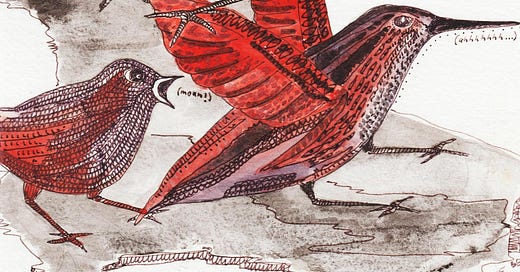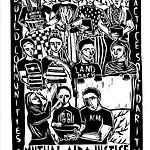Hello friends!
We’re back with another episode in our running series on Disasters, Crisis, and Collective Futures - this time looking at the “slow violence” of environmental disasters and degradation, the links between this violence and settler-colonialism, and the long standing practices of Aboriginal refusal and resistance against the crisis conditions of colonialism.
This series began with podcast Episode 12 - After the Flood, and continued in Episode 13 - Disaster Communism with Nick Southall and Episode 14: "Crisis Colonialism" & the expanding frontiers of empire. In these episodes - in the wake of Cyclone Alfred - we spoke about so-called “natural” disasters and how, during them, the horizons of political possibility, and the ways we relate to each other, can shift and change. We talked about how those moments of disruption can be seized by colonial and capitalist actors to expand frontiers of extraction and control, and also how communities experiencing disruption sometimes radically reorganise themselves around principles of mutual aid and collective care.
Something we’ve talked a bit about in this series is that crises, disasters, are not evenly distributed. Some people are far more frequently faced with disaster conditions - often as a result of state violence and neglect, capitalist exploitation, (and the “externalities” resulting from those activities), and because of the ongoing violence of settler-colonialism.
For those of us who tend to experience disasters as short, sharp, and intermittent or rare shocks, it’s important to consider:
what the uneven distribution of disasters and crises tells us about the material realities of colonialism and capitalism
how we can be in solidarity with people more regularly exposed to disasters, including people who’ve been doing the work of fighting for kin and Country and justice, and fighting against the forces of colonialism and capitalism, for hundreds of years.
To help us think these things through, we could not be more delighted than to be bringing you this conversation with Rikki Dank, Gudanji and Wakaya woman and one of the directors of Gudanji For Country. Gudanji For Country is a grassroots First Nations organisation working to protect Country from colonial exploitation, overgrazing, mining, and fracking, to educate, advocate, and to create sustainable futures.
This interview with Rikki covers a wide range of topics, including the relationship between the slow violence of environmental degradation and colonialism, the links between climate change and colonial capitalism, the history of damaging, extractive practices on Gudanji Country and across the Beetaloo Basin and elsewhere (from the damage wrought by early colonising pastoralists through to contemporary fracking), and how Aboriginal People have fought and found ways to care for community and Country in defiance of the colonial-capitalist apparatus.
Through this interview, we see the long emergency of colonialism and of climate change, not as something expressed only through short and sharp big events (like Cyclone Alfred), but also through creeping pollution, contamination, degradation, exploitation, displacement, and damage to lifeways. In learning to pay attention to these different temporal expressions of disaster and crisis, we can better learn how to organise ourselves and our struggle as climate change escalates.
Rikki Dank also spoke with us of Indigenous futurities and possibilities, of healing Country, of care, and of love - love as a feeling and as an orientation to the work of struggle, of organising, of activism, of building and maintaining community, of care, of creating possibilities for each other. She speaks of love as a feeling, love as an action, love as the steadfast refusal to be dispossessed by settler-colonialism, or to give up.
(The centrality of love also brought to mind our conversation with Nick Southall about disaster communism a few weeks back - he also spoke of love, and the love of people and for people that helps drive us into and sustain us in struggle).
We hope you enjoy this conversation with the wonderful Rikki Dank, and encourage you to follow her work with Gudanji for Country by signing up to their newsletter, following them on Instagram, and if you can, consider supporting their work through a donation.
Yours in solidarity,
The Radio Reversal Collective.









Share this post